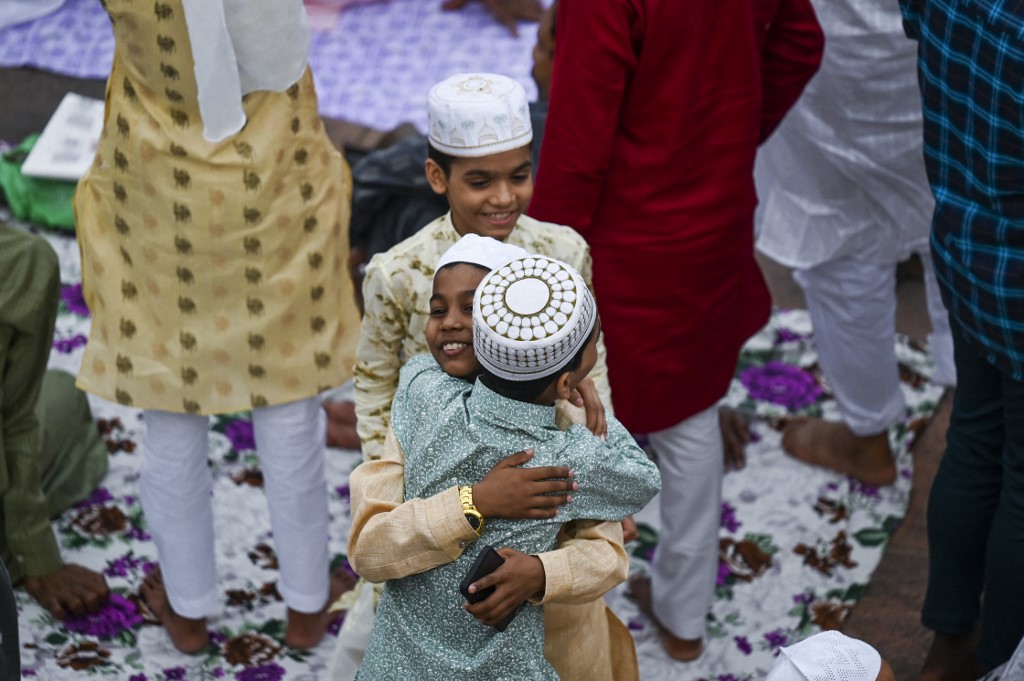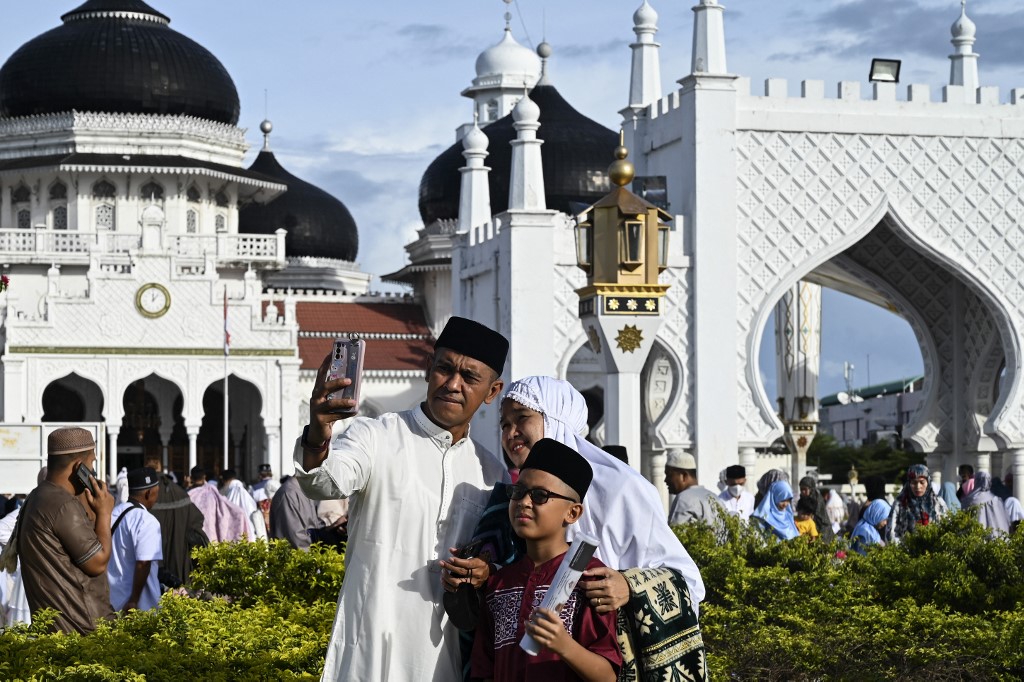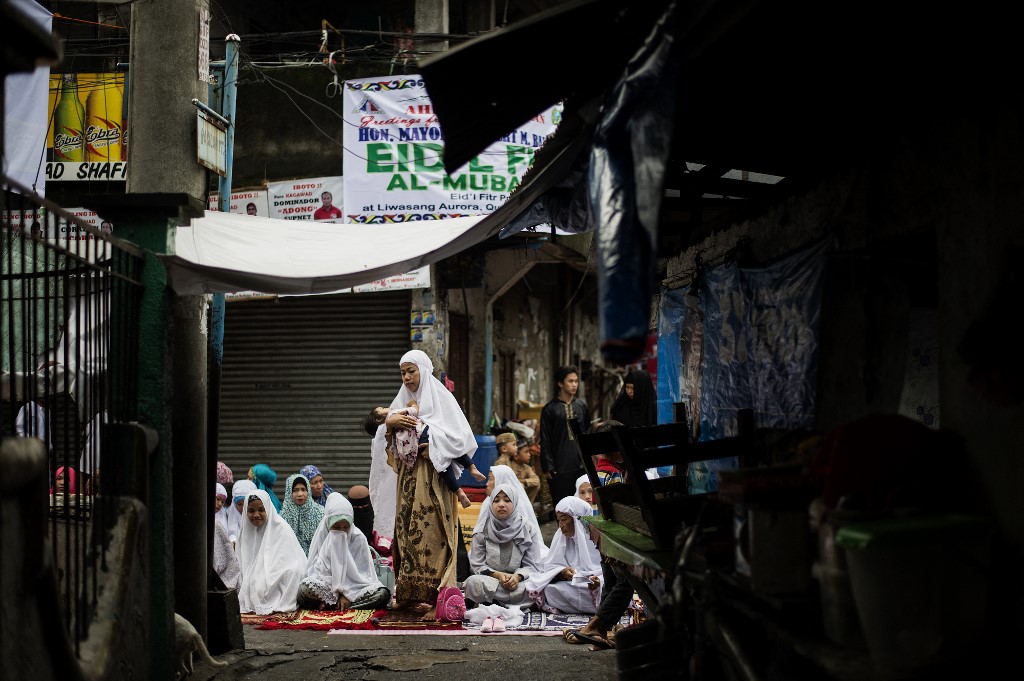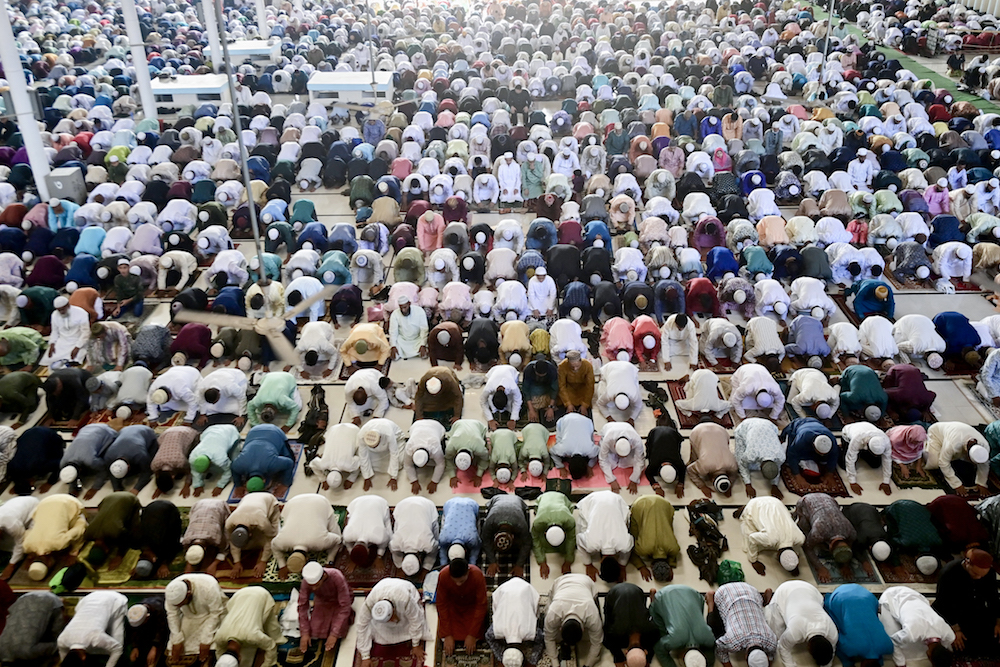JAKARTA/NEW DELHI/COLOMBO/MANILA: Muslims across South and Southeast Asia are celebrating Eid Al-Fitr with feasts at which distinctive, traditional local dishes not only mark the end of a month of fasting during Ramadan but also help to reinforce, through food, the connections families share with their loved ones and ancestors.
Asia is home to about 65 percent of the world’s Muslims, and the three largest Muslim-majority countries, based on population, can be found there: Indonesia, Pakistan and Bangladesh.
In Indonesia, more than 230 million people profess to follow Islam, a figure that represents 86 percent of the country’s population and about 13 percent of all Muslims in the world.
The archipelago nation, which stretches more than 5,000 kilometers from east to west and 1,700 kilometers north to south, is home to more than 1,000 distinctive ethnic groups, all of which have their own traditions.
During Eid Al-Fitr, however, many customs and traditions span the normal divides between groups in such a diverse nation. These include giving generously to charity, visiting relatives, buying new outfits in which to pray, and sitting down for feasts that include popular local and national dishes.
One Eid staple in Indonesia is rendang, a slow-cooked dish of meat braised in coconut milk, galangal, lemongrass and other aromatic spices until it becomes caramelized. This hearty meal originated in Sumatra but now has multiple variations across the country.
Rendang is often paired on Eid tables with opor ayam, a Javanese chicken stew made by simmering the meat in coconut milk, curry paste and lemongrass.

Children greet each other after offering a special morning prayer to start the Eid Al-Fitr festival at the Jama Masjid mosque in the old quarters of New Delhi. (AFP)
Then there is ketupat, which is rice cakes packed inside young coconut leaves woven into a diamond shape. Many believe the dish was introduced by Sunan Kalijaga, a 15th-century theologian and one of the legendary nine missionaries credited with the spread of Islam in Java.
“During Eid, we will always have ketupat, rendang, opor ayam, papaya leaves and long beans cooked in coconut milk, and chicken liver and potatoes in fried chili,” Diella Yasmine, 31, from Jakarta, told Arab News.
She added that she also includes on the menu telur petis, hard-boiled eggs fried in a shrimp sauce, a dish she associates with her childhood and her family’s roots.
“My father is from East Java and this is just one of those dishes that must be served at the dinner table there,” said Yasmine.
“The dish always reminds me of my grandma’s home. When we used to go back to our hometown, this dish was always served. My grandma and grandfather have already passed away, so this telur petis is especially memorable.”
She revealed that her family is very strict about how the dish is prepared.
“Our recipe has been handed down for generations, from my great-grandparents. All the measurements must be consistent with the recipe,” said Yasmine.
In addition to authentic traditional recipes, she said there is one other element that is critical to the success of a dish.

An Indonesian family takes photographs after Eid Al-Fitr prayers at Baiturrahman Grand Mosque in Banda Aceh. (AFP)
“The secret to our family’s Eid cooking is using a traditional stove,” Yasmine said. “This makes it unique compared to our usual cooking. My family will always use a traditional stove and coconut fiber, which gives a smoky taste when we cook dishes with coconut milk.”
Pakistan is home to 212 million followers of Islam, while Bangladesh has 154 million. There are also more than 200 million Muslims in Hindu-majority India. These three countries account for almost a third of all Muslims in the world.
Each of the nations has its own distinctive identity but their peoples share many cultural traits, including a craving for sweets when Ramadan draws to an end.
Some of these cravings are satisfied during Eid by a traditional dessert known as seviyan or sawai in Pakistan and India, and shemali in Bangladesh, which is based on vermicelli pudding.
“The most important dish on Eid is sawai, or vermicelli — it is a must,” Rafat Shahab, a chef and caterer from Delhi, told Arab News.
“There are two types of sawai. One is muzaffar, which is without milk and is sweet and tasty. The other is sheer khorma, which has milk. You have to cook it slowly to bring out the taste. Eid is not complete without the sawai dish.
“Besides sweet dishes, other items on the menu are generally biryani — either mutton or chicken — chicken curry, and some vegetarian dishes.”
These meat and plant-based dishes have local variations across the northern parts of the subcontinent. However, Kashmir, the Himalayan territory claimed by both India and Pakistan, has its own distinctive traditions and cuisine. Eid in Kashmir is synonymous with wazwan, a multi-course meal in which most of the dishes are heavy on meat.

Muslims offer Eid Al-Fitr prayers on a street in front of a mosque in Manila. (AFP)
“Everyone prepares wazwan,” Farooq Ahmad, a chef in Srinagar, the largest city in the region, told Arab News. “At home, people prepare five or six types of wazwan dishes, such as gushtaba, rista, kabab and all.”
Gushtaba is a dish of velvety-textured meatballs cooked in spicy yogurt, while rista is meatballs in a red, paprika-saffron-fennel gravy.
“In Kashmir, the focus is not on sweets,” said Ahmad. “People don’t prepare sweet dishes at home. People buy sweet dishes for whenever they visit other people’s houses during Eid.”
In the south of the subcontinent, however, sweets dominate holiday tables. Ummi Abdulla, 85, from Calicut in Kerala, has written several cookbooks based on her recipes, and is known locally as the “matriarch” of Malabar Muslim cuisine. In her kitchen, she said, two dishes are always on the menu during Eid: chakkara choru, also known as jaggery rice, and banana curry.
“The chakkara choru is prepared with coarse wheat and jaggery (a natural sweetener made from sugar cane juice or palm sap),” she told Arab News. “This is very typical of Kerala, not found anywhere else in India.
“For banana curry we use thin coconut milk in the beginning, and after it is baked we add thick coconut milk and sugar. It’s very tasty. In Kerala, we find different kinds of bananas and no festival is complete without bananas.”
In neighboring Sri Lanka, where 2 million Muslims make up almost 10 percent of the country’s predominantly Buddhist population, sweet dishes are also the most keenly anticipated Eid treats, the most popular of which is watalappan, or cardamom-spiced coconut custard.
“Eid means wattalapam,” said Nafha Musthaq, a homemaker in Colombo who previously worked as an accountant in Dubai.
In her home, the Eid menu starts with vermicelli, beef curry and sweet sago porridge for breakfast and lunch, traditionally followed by biryani for dinner. But the day ends with watalappan.

Bangladeshi Muslims offer Eid al-Fitr prayers, which marks the end of their holy fasting month of Ramadan, at the National Mosque of Bangladesh, Baitul Mukarram in Dhaka. (AFP)
“It’s a sweet dish made of jaggery, eggs, coconut milk and cardamom,” said Musthaq, who added that the secret to achieving the best flavor lies in the type of sweetening agent used; she always chooses jaggery extracted from kithul, a sugar palm native to Sri Lanka.
“It’s good if you can use1 kilogram of it for every 15 eggs,” she said. “This is a special dish in every household.”
To the east, in the Philippines, where Muslims are a minority that constitutes about 5 percent of the country’s population of nearly 110 million, the favorite Eid dessert is panyam, a type of fried pancake. It is made with ground glutinous rice, brown sugar and coconut milk.
However, it is not the highlight of the holiday feast for Filipino Muslims, most of whom belong to the Tausug ethnic group primarily native to southwestern parts of the Mindanao island group. Instead, the Eid culinary spotlight belongs to tiyula itum, or “black stew.”
Sometimes known as “royal beef stew” and historically linked to the dining rooms of the former Sultanate of Sulu, which survived into the early 20th century, tiyula itum is nowadays served only on special occasions linked to Tausug traditions.
Cooking the stew is a complex process. Marinated beef is combined with charred coconut powder, which gives the dish its signature black color. The meat is then mixed with sauteed onions, garlic and lemongrass and slowly brought to a boil. Toward the end of the cooking process, hot chili is added to give the spicy kick that many people love.
“Most of us go all-out celebrating Eid, and having beef stew and tiyula itum with yellow rice is common at every Muslim Filipino table during the celebration,” Nur-mukin Usman, a guest lecturer at Mindanao State University, told Arab News. “The ingredients, especially the burned coconut husk, need to be prepared a day ahead or early in the morning.”
Kiram Irilis, a school superintendent in Sulu, a southern province that is part of the Bangsamoro Autonomous Region in Muslim Mindanao, said that tiyula itum must always feature during the Eid celebrations.
“That’s what I prepare for my people,” he said. “After our Eid Al-Fitr prayer, I feed everyone who enters the mosque. That is how we express our gratitude that we finished the month of fasting, that we persevered.”





























